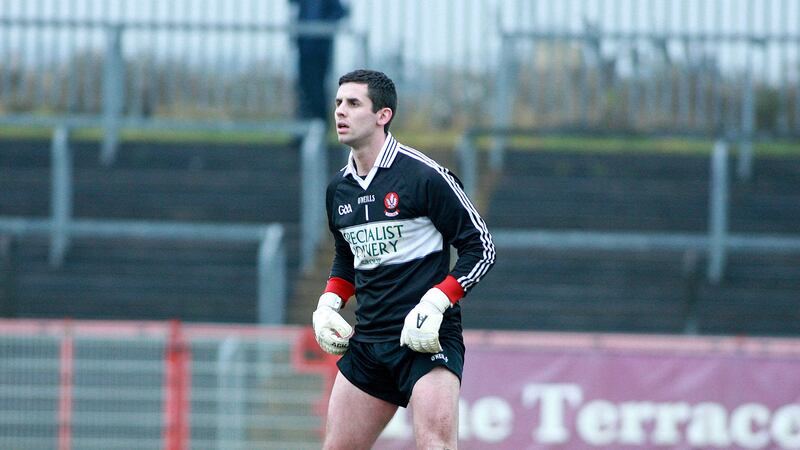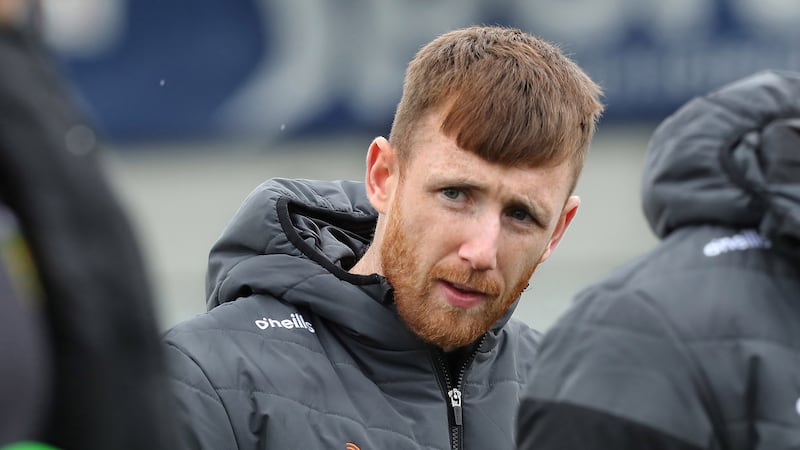THE past week has brought revelations in Derry that are usually post-Ulster.
The news that Eoin McNicholl and Barry and Colm McGoldrick have left the panel, that Ryan Bell will go to America in June and that Benny Heron will almost certainly follow in July is not untypical of recent summers - though it is untypical of those particular individuals.
Damian Barton is quickly finding out why his predecessors struggled. Brian McIver’s term was beset by mid-season defections. Over three years, the job turned his outlook from one of radiant positivity when he took over to increasing narkiness at referees. That simply became a means of venting his frustration.
Damian Cassidy came into the job with equally high hopes. Sat at his kitchen table in Ballynease the week he was appointed in 2008, one of the heroes of ’93 spoke of wanting to put pride back in the Derry geansai. He didn’t know it then, but he inherited the dying embers of a squad. They should have won an Ulster title earlier that year and were on the far side of the mountain when Cassidy took over.
A great forward, a hugely successful club manager, a deep thinker and hugely knowledgeable about the modern game, Cassidy was unable to evoke the passion he desired. When they were heavily beaten by Kildare at Celtic Park in 2010, it was clear his two years had been enough to drain his spirit.
John Brennan’s fire and brimstone roused them briefly, but it was a temporary flirtation with the upper echelons. He left after they scraped to Division Two safety and lost to Longford in the Championship.
Brian McIver came to herald a new era. With Paddy Tally, he set about manufacturing a new level of professionalism. Promotion from Division Two was followed by a run to a Division One final. En route, they won in Kerry and beat Dublin in front of an uncharacteristically well-populated Celtic Park.
That afternoon, the crowd stayed behind in the Tomás Ó Maolain stand. When the Derry team left their huddle, they saluted their supporters. McIver led them with something resembling a series of Jurgen Klopp’s fist pumps.
Victory over Mayo with 14-men at Croke Park pushed them on again, but the wheels then came off spectacularly. Dublin handed out the coldest of revenge dishes before a Donegal side without both its first-choice midfielders did enough in 15 minutes after half-time to get out of Celtic Park in the Ulster Championship.
By the time they played Longford in a Qualifier four weeks later, McIver’s hand had been decimated. Some had gone to America, some had just left to go and concentrate on their clubs. As 2015 became a damp squib, players talked of the unsustainable commitment levels from the year previous.
There’s just no appetite in Derry for the back door. That seems strange given that, when the system was introduced, Derry spent the first seven years being referred to as the ‘Kings of the Qualifiers’. But for almost the last decade, there might as well have been no back door. The end of Derry’s Ulster campaign has spelled the end of their Championship.
That’s the way for most counties. Tyrone last year were one of only three teams ever to reach an All-Ireland quarter-final from the first round of the Qualifiers. Their whole mentality is just different. It’s so geared towards the county. While they retain a fiercely competitive club championship, for the men involved that Tyrone jersey is everything.
The value of the Oak Leaf on the breast of the Derry shirt has been diminished. Jim McKeever and Sean O’Connell, Adrian McGuckin and Mickey Niblock, the 1993 heroes, they won trophies with Derry because of their unstinting loyalty.
Nowadays, a lot of young players think very little of it. It’s as if they feel that coming through U15 development squads gives them a right to a senior jersey. And if they’ve trained for four months and aren’t getting on the team? Well, then it’s time to go back to the club.
But it was easier to serve both masters in those times of success. Players weren’t forced to choose between club and county on an almost weekly basis. And Derry footballers love their clubs.
There are individuals there who give every ounce they have to the county cause. Men like Mark Lynch, Chrissy McKaigue, Sean Leo McGoldrick, Danny Heavron and plenty more. But some others haven’t had the belief Derry are going to contend for Ulster and All-Ireland titles and it undermines the building process.
Players inevitably leave and others don’t take the call, as Barton alluded to in The Irish News last week. The Newbridge man revealed that some of the U21 players had declined invitations to join the senior panel for the summer.
Anyone would think those young lads would jump at the chance. But not only is it a big commitment, it also pretty much bars you from a summer of club football, choosing instead a summer of training with no games.
Derry never really struggles to get its best 15 players to commit (with the exception of Eoin Bradley). But it’s a lot of the next 15, the ones who would really give the squad depth, they often fail to retain.
The country talks about this attitude and lack of continuity being 'the problem with Derry'. That so many of the players love their clubs to the detriment of their county. It’s a mindset that leaves Barton facing the same uphill battle every Derry boss since Eamonn Coleman has struggled with. But while the county might not win All-Irelands, they have a far better balance between club and county than most others.
Glen’s crop of four Ulster minor-winning teams are being heralded as the stars of the club’s great future first and, maybe, Derry’s second. As yet, few have ventured to the county setup. There are certainly more than just Emmett Bradley capable.
The players in the Oak Leaf county are as ambitious as any in Ireland. They are as committed as any in Ireland. But in so many cases, the commitment is to their club first.
Youngsters grow up now dreaming of Derry and Ulster club titles. The formative work is done at their club grounds. The kids in Slaughtneil see the Seamus McFerran Cup paraded through a packed, delirious club hall and weigh it against 18 fruitless years for Derry; which do you think they’re going to choose?
That is not a good thing for any grand ambitions of winning Sam Maguire back, but for the 98 per cent the GAA talks so much about, it’s a better scenario than most.








